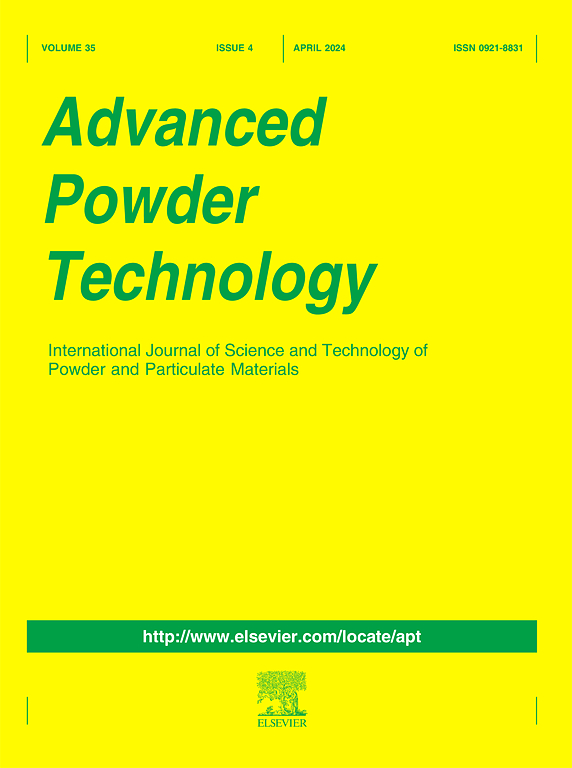Effect of MoS2 lubricant content on percolation behaviour in powder compression
IF 4.2
2区 工程技术
Q2 ENGINEERING, CHEMICAL
引用次数: 0
Abstract
Considering the influence of lubricant content on the densification quality of the compactor, the percolation behaviour between particles, and the changes in mechanical behaviour among them, powder pressing was performed using a universal testing machine to verify the effect of the infiltration behaviour of solid particle lubricants on compaction and mechanical performance. The test results reveal that the transverse percolation of lubricant particles at the top of the compacted metal powder becomes more pronounced during the pressing process. Additionally, as the lubricant content increases, the intensity of particle percolation also increases. MoS2 solid particle lubricants improve the density, hardness, and porosity of the compact and significantly enhance the densification. However, excessive lubricant leads to agglomeration, which reduces the compressibility of the compacted metal powder. This research expands the theories of powder forming mechanics and particle percolation, providing valuable guidance for further improving the densification of metal powder compacts.

二硫化钼润滑剂含量对粉末压缩中渗透行为的影响
考虑润滑剂含量对压实机致密化质量的影响、颗粒间的渗透行为以及颗粒间力学行为的变化,采用万能试验机进行压粉试验,验证固体颗粒润滑剂的渗透行为对压实和力学性能的影响。试验结果表明,在压实过程中,金属粉末顶部的润滑颗粒横向渗透现象更加明显。此外,随着润滑剂含量的增加,颗粒的渗透强度也增加。二硫化钼固体颗粒润滑剂提高了致密体的密度、硬度和孔隙率,显著增强了致密性。然而,过量的润滑剂会导致结块,从而降低压实金属粉末的可压缩性。本研究拓展了粉末成形力学和颗粒渗流理论,为进一步提高金属粉末压坯的致密性提供了有价值的指导。
本文章由计算机程序翻译,如有差异,请以英文原文为准。
求助全文
约1分钟内获得全文
求助全文
来源期刊

Advanced Powder Technology
工程技术-工程:化工
CiteScore
9.50
自引率
7.70%
发文量
424
审稿时长
55 days
期刊介绍:
The aim of Advanced Powder Technology is to meet the demand for an international journal that integrates all aspects of science and technology research on powder and particulate materials. The journal fulfills this purpose by publishing original research papers, rapid communications, reviews, and translated articles by prominent researchers worldwide.
The editorial work of Advanced Powder Technology, which was founded as the International Journal of the Society of Powder Technology, Japan, is now shared by distinguished board members, who operate in a unique framework designed to respond to the increasing global demand for articles on not only powder and particles, but also on various materials produced from them.
Advanced Powder Technology covers various areas, but a discussion of powder and particles is required in articles. Topics include: Production of powder and particulate materials in gases and liquids(nanoparticles, fine ceramics, pharmaceuticals, novel functional materials, etc.); Aerosol and colloidal processing; Powder and particle characterization; Dynamics and phenomena; Calculation and simulation (CFD, DEM, Monte Carlo method, population balance, etc.); Measurement and control of powder processes; Particle modification; Comminution; Powder handling and operations (storage, transport, granulation, separation, fluidization, etc.)
 求助内容:
求助内容: 应助结果提醒方式:
应助结果提醒方式:


